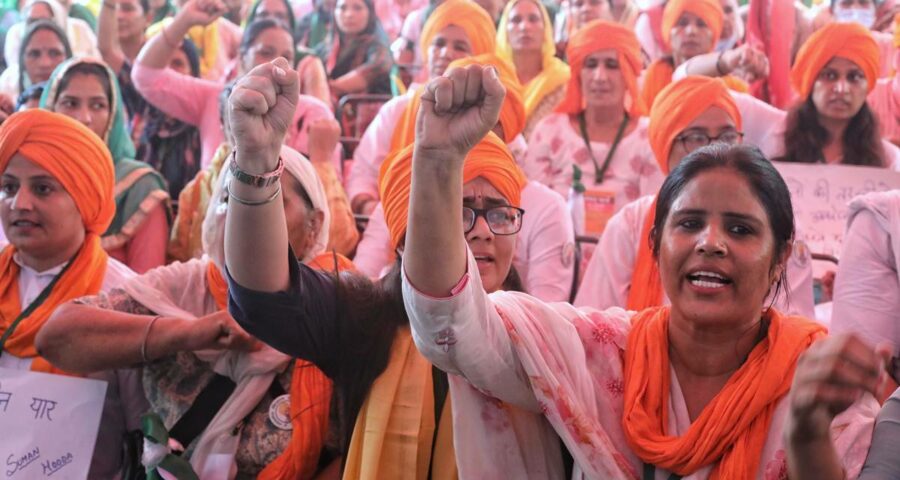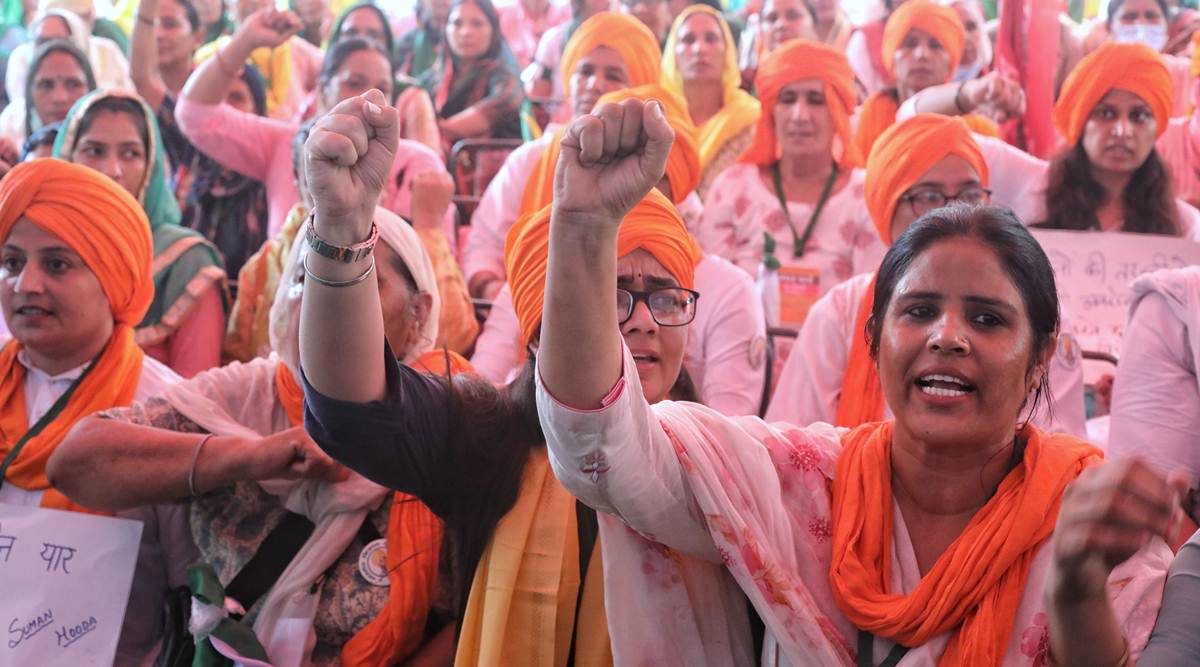Discussions revolved around the “crumbling” mandi system, inflation, unemployment, and corporatisation.
Barely 2 km from Sansad Bhawan where the monsoon session is underway, a parallel ‘mahila kisan sansad’ with close to 200 women in attendance was held at Jantar Mantar on Monday. Three sessions took place, each with a ‘speaker’ and two ‘deputy speakers’, from 11 am to 5 pm, and around 110 women were given a platform to voice their concerns on the three farm laws.
This was the third day of the farmers’ protest at Jantar Mantar, which saw women from all age groups and several states.
Discussions revolved around the “crumbling” mandi system, inflation, unemployment, and corporatisation. The ‘speakers’ and ‘deputy speakers’ also touched on women-centric issues such as problems faced by widows in attaining property rights, land ownership, lack of amenities for women at Delhi’s borders, and the alleged Tikri molestation case.
Jaspreet Kaur (50), who lost her husband six years ago after he committed suicide, said she is still struggling with his Rs 6 lakh debt. And the three laws are not helping her: “We have a two-acre plot of land where we grow gehu and dhan. Things slowed down because of the lockdown. Without the mandi system, we will be totally helpless. I have reached out to numerous authorities to help me pay my debts. My husband killed himself due to the debts and now my son tells me that he does not want to live like this either…”
She has been at the Singhu border since the protest started eight months ago while her sons, aged 18 and 20, are tending to the land in Tarn Taran.
For Harvinder Kaur (20) from Hoshiarpur, who is from a farming background but hopes to pursue her BA degree abroad, the biggest concern is inflated prices. She said, “We are fighting for all because once everything comes under corporates, people will have to pay much more.”
Her companion, Raman (17), lost her father when she was a child. She, her mother, and sister left farming and took up jobs instead. She works as a house help and said she’s against the three laws as life would become harder if expenses go up any further.
Many such women voiced their concerns in the sessions. The first was presided over by AIDWA vice-president and CPI(M) member Subhashini Ali. Protesters spoke about the seven women who have died at the borders and paid respects to them, saying they will keep them in mind along with the Kargil martyrs.
Session 2 was presided over by Annie Raja, CPI leader and general secretary of the National Federation of Indian Women, who said people generally imagine farmers as men in the country even though many women are farmers too and their contribution is not always considered. A few women from Rajasthan then took to the stage to emphasise that the protest is not limited to farmers from Haryana and Punjab.
Social activist and Narmada Bachao Andolan founder member Medha Patkar, who came from Maharashtra, was the speaker in the third session. Several women spoke of safety concerns at Tikri border. Speaking to The Indian Express, Patkar said, “Women have been very perseverant throughout the movement… if we can’t have proper representation in Parliament, it’s better to have such a parallel parliament, where women from many states, Dalit women, widows are represented.”
Addressing the media at a press conference after the third session, Subhashini Ali said, “Women’s contribution to farming is barely ever considered. It is very difficult for them to get loans as the men in the household are considered farmers.”
Also at the protest was Bhagat Singh’s niece Gurjeet Kaur, who said: “If my uncle was alive today, this would not have been the situation. We would have won much sooner…”
At the end of the day, the speakers read out their demands from the government — all 200 women raised their hands in support.
Meanwhile, police deployment comprised mostly women too. A police officer said there were at least two companies inside Jantar Mantar and more than 50% were women.
Source: Read Full Article



